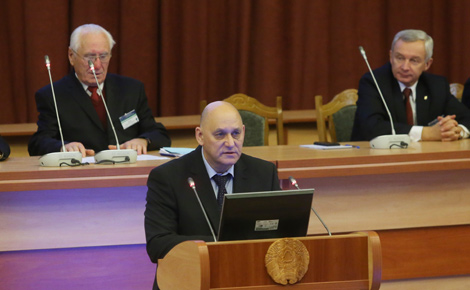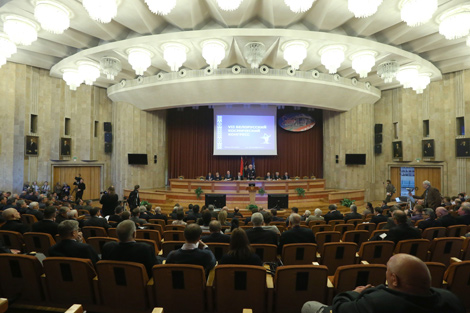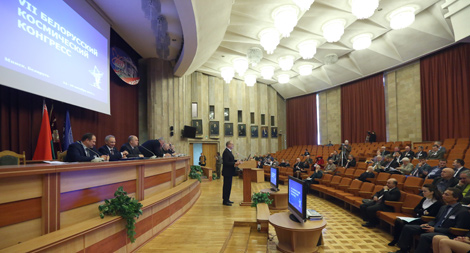Opinions & Interviews
Belarus, Russia urged to expand their constellation up to 24 satellites

MINSK, 24 October (BelTA) – Belarus and Russia need to expand their satellite constellation up to 24 satellites, Deputy State Secretary of the Belarus-Russia Union State Aleksei Kubrin told the media at the seventh Belarusian Space Congress on 24 October, BelTA has learned.
“Space research will require an increased Belarus-Russia satellite constellation in the future. One satellite can capture an image of the Earth just once every 36 hours. If an emergency happens – a hurricane, a fire, or a tsunami – the satellite will obviously deliver the data too late. It is necessary to operate in real time to achieve as effective remote sounding as possible and promptly respond to emergencies. This requires a constellation of at least 24 satellites. It is impossible to promptly take decisions and respond to emergencies with the amount of satellites we have now makes. It goes without saying that the main issue is financing. This is why it is necessary to develop competitive space technologies and small spacecraft, and also get involved in the commercialization of space,” Aleksei Kubrin said.
In his words, the possibility of making recoverable space vehicles for government and commercial use is now being actively discussed. “The exploration of outer space, including Mars, is under discussion. We should take part in this activity, too,” the deputy state secretary remarked.
 Aleksei Kubrin believes that, according to current trends, states need to unite in order to carry out space programs on of mutually beneficial conditions. He mentioned Belarus and Russia as an example of such cooperation. “Russian space vehicles widely use Belarusian technologies. They are related with optoelectronic systems and engines. Russia also shares its technologies. We have established close cooperation,” he added.
Aleksei Kubrin believes that, according to current trends, states need to unite in order to carry out space programs on of mutually beneficial conditions. He mentioned Belarus and Russia as an example of such cooperation. “Russian space vehicles widely use Belarusian technologies. They are related with optoelectronic systems and engines. Russia also shares its technologies. We have established close cooperation,” he added.
As many as five Union State space programs have been completed so far, there are another two underway – Monitoring-SG and Technology-SG. “Under these programs, cooperation has been established between over 60 Russian and Belarusian companies. Some 26 of them are Belarusian. All of them operate in different fields of space science: materials science, spacecraft instrumentation, and algorithmic support. I can cite some Belarusian organizations as an example: Heat and Mass Transfer Institute of the National Academy of Sciences of the Republic of Belarus (NASB), the NASB United Institute of Informatics Problems, OAO Integral, and OAO Peleng. We are closely interacting with them. Thanks to the results achieved, we cut the cost of launching a satellite, use new technical principles for instrumentation, and reduce the mass of spacecraft,” noted Yuri Makarov, Director of the Department for Strategic Planning and State Space Programs of the Russian space agency Roscosmos.
 The seventh installment of the Belarusian Space Congress is taking place in Minsk from 24 to 26 October. The forum is organized by the NASB and the NASB United Institute of Informatics Problems. The forum participants will hear out over 120 reports by scientists and specialists from Belarus, Russia, Ukraine, Kazakhstan, and other countries. The congress is meant to discuss new achievements in space exploration, define top priorities in space research, and strengthen international cooperation in space exploration and the peaceful use of outer space. The plenary reports will present innovative technologies in information systems ensuring safe operation of space rockets, space equipment, and ground-based space facilities. They will also summarize the results of implementation of the Belarusian part of the Union State program Monitoring-SG and outline prospects for Belarus’ space cooperation with Russia, Ukraine, and other CIS member states. The participants are set to consider the methods of space monitoring of agricultural production in Kazakhstan and hear out some information on the impact of numerous small space vehicles and large orbital constellations on man-made pollution of the near-Earth space.
The seventh installment of the Belarusian Space Congress is taking place in Minsk from 24 to 26 October. The forum is organized by the NASB and the NASB United Institute of Informatics Problems. The forum participants will hear out over 120 reports by scientists and specialists from Belarus, Russia, Ukraine, Kazakhstan, and other countries. The congress is meant to discuss new achievements in space exploration, define top priorities in space research, and strengthen international cooperation in space exploration and the peaceful use of outer space. The plenary reports will present innovative technologies in information systems ensuring safe operation of space rockets, space equipment, and ground-based space facilities. They will also summarize the results of implementation of the Belarusian part of the Union State program Monitoring-SG and outline prospects for Belarus’ space cooperation with Russia, Ukraine, and other CIS member states. The participants are set to consider the methods of space monitoring of agricultural production in Kazakhstan and hear out some information on the impact of numerous small space vehicles and large orbital constellations on man-made pollution of the near-Earth space.
An exhibition of scientific space-related products has been arranged in the NASB Presidium quarters to showcase the results of the Union State scientific space-related programs, demonstrate children’s pictures, and display technical and popular science literature.







 print version
print version make home page
make home page add to bookmarks
add to bookmarks

